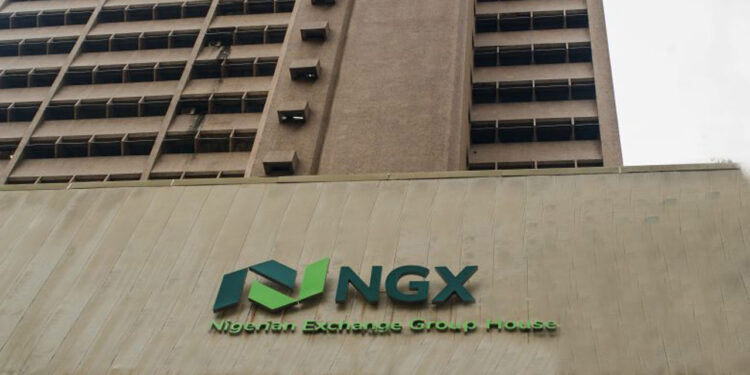The Nigerian Equities Market witnessed its third consecutive loss this week as the NGX-ASI closed downwards by 1.88% to settle at 53,018.97pts.
The negative performance was occassioned by losses recorded in AIRTELAFRI (-10.00%), IKEJAHOTEL (-9.85%), MULTIVERSE (-9.59%), ROYALEX (-9.33%) and INTENEGINS (-7.75%) outweighed the gains printed in WAPIC (+7.50%), MBENEFIT (+6.25%), CWG (+5.26%), ETERNA (+4.46%) and CUTIX (+3.60%).
This is even as the World stock markets wavered as investors dwelled on US Data which showed recession concerns and a bumper interest-rate hike in New Zealand.
London rose but Frankfurt and Paris fell in muted trade during a holiday-shortened week.
Asian indices drifted after losses on Wall Street, as data showing a softening in the US jobs market pointed to a slowdown in the world’s biggest economy.
Oil dipped, having spiked earlier this week following shock output cuts from OPEC+ crude producers.
“Markets are drifting as investor thoughts start to turn towards the scale of severity, as the likelihood of a recession later in the year in the US increases,” said Richard Hunter, head of markets at trading firm Interactive Investor.
However, the central bank of New Zealand on Wednesday became the latest to hike interest rates sharply to tackle soaring inflation.
The Reserve Bank of New Zealand lifted its rate by a larger-than-expected 50 basis points to 5.25 percent.
“Central banks seem currently divided on whether inflation has peaked and therefore whether to tap on the tightening brakes,” Hunter told AFP.
“The New Zealand decision is in contrast to the Australian decision to hold, and the market consensus is at the moment evenly split between whether the US Federal Reserve’s next move is a final 0.25 percentage point rise — or no action at all.”
After March’s banking sector-sparked turmoil, markets have enjoyed a few bright weeks on optimism the Fed will temper its interest rate hikes earlier than thought.
The rally continued at the start of this week, even after surprise cuts in oil output by major producers sent prices soaring and reignited worries over inflation, which has been coming down in the past months.
But New York traders turned sellers Tuesday after data showed February job openings at US companies fell to their lowest level since May 2021 and below forecasts.
ALSO READ:Opposition Federal Lawmakers Form Alliance To Counter ‘Excesses’ Of Ruling APC At 10th Assembly
While figures showing a strong labour market have been welcomed as giving the Fed room to stop hiking rates, analysts said the reading was also seen as a warning that the economy was on the slide.
Gold sparkles
The price of gold, considered a safe bet in times of economic turmoil, rose Wednesday toward a record peak, one day after breaking $2,000 per ounce.
Gold climbed as high as $2,028.44, a level last seen in early 2022 and not far from a record $2,075.47 set in August 2020.
“Investors fled to the yellow metal as a safe-haven play, given uncertainty about US growth expectations,” said TickMill Group analyst Patrick Munnelly.
Fed Cleveland boss Loretta Mester warned that rates needed to go above the current five percent for the Fed to get control of inflation.
That message came despite worries about the banking sector, which saw the collapse of three US regional banks last month and the emergency buyout of Credit Suisse by Swiss rival UBS.
Traders were jarred by JPMorgan Chase chief Jamie Dimon’s warning that the banking crisis “is not yet over” and that inflation could linger at high levels, extending the period of higher interest rates.
In Basel, UBS chiefs told shareholders on Wednesday that the takeover of Credit Suisse was a “Herculean task” strewn with risks, but still the right decision.
However, in Nigeria, Sectoral performance was positive as the Banking (+0.49%), Oil and Gas (+0.12%) and Industrial (+0.04%) sectors closed upwards while the Consumer Goods (-0.26%) sector closed negative.
In terms of activity levels, total volume and value decreased by 33% and 13% respectively as investors exchanged about 197 million units of shares worth N2.67 billion. UBA (+0.60%) was the most actively traded stock with about 64 million units of shares worth about N537 million.
Also the National Bureau of Statistic, (NBS) is scheduled to publish its inflation report for March on April 15 and some analysts are predicting the official headline inflation will slow.
Infact, Bismark Rewane, chief executive of the Financial Derivatives Company, in the current FDC Economic Bulletin says it will slow by 0.06% to 21.85 percent.
“Despite the projected decline in inflation in March, inflationary pressures remain potent. The revalidation of the old naira notes as legal tender will have the effect of increasing the cash in circulation by over 25%. The risk of higher prices will require the CBN to be more innovative in its inflation containment strategies. These and other major considerations will dominate the thinking of the committee at its next meeting in May”, Rewane said.













